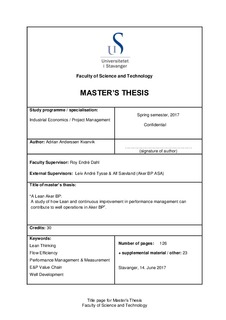A Lean Aker BP: A study of how Lean and continuous improvement in performance management can contribute to well operations in Aker BP.
Master thesis
Submitted version
Permanent lenke
http://hdl.handle.net/11250/2456234Utgivelsesdato
2017-06-14Metadata
Vis full innførselSamlinger
- Studentoppgaver (TN-ISØP) [1428]
Sammendrag
The Exploration and Production (EP) sector have lately experienced a state of depression in wake of an abating demand, low petroleum commodity prices and a high level of operating costs. This downfall has in effect driven EP operator and service companies alike to reevaluate and reshape operations in an attempt to improve efficiency and profitability. As companies concentrates on core competencies to leverage their clout for market dominance, performance of key operations has become paramount. Managing performance is thus widely viewed as crucial to the successful implementation of the initiative. To address ongoing problems and inefficiencies in well operations and moreover ensure that underlying changes endure, some EP operators have refocused their attention to long-term innovation by transforming traditional performance management approaches to Lean Thinking and continuous improvement.
Following an original case study design with an in-depth analysis of the department Drilling and Wells (DW) in the EP company Aker BP ASA, the chief undertaking of this thesis has been to determine how Lean and continuous improvement in performance management can contribute to the company's well operations. Seated at the centre of this study is a conceptual research framework with an exploratory sequential design, encompassing a thematic literature review and both qualitative and quantitative methods for analyses. The natures of the research objectives have been to determine relevant elements of current and prior practices for performance management, strategic elements and directions, critical areas of concern and new practical solutions encompassing Lean and continuous improvement principles for bettering well operations in Aker BP, DW.
Preliminary findings recognised several important elements in current and prior performance management frameworks. On account of high investment costs and impact on bottom line, it was concluded that continuous improvement would best contribute in well development processes in the field development phase of the EP value chain. Results moreover affirmed that directing attention to the definitions of improvement theory in terms of flow efficiency, would enable DW in utilising Lean Key Performance Indicators (KPIs), being Takt, Cycle and Lead Time, to address waste and non-value added (NVA) time across a standardised set of activities. This facilitated the opportunity of keeping track with customer's demand and identifying low performing activities in a well development process, thus providing the means for improved planning and comparison with future projects. Findings also determined that the use of additional Lean KPIs in conjunction with the Best In Class (BIC) and Process Activity Maps (PAM), would make it straightforward to identify latent bottlenecks and loss of potential.
Adapting the foregoing in a Lean Six Sigma framework for performance management following a continuous Define-Measure-Act-Improve-Control (DMAIC) cycle, furthermore demonstrated how the above could contribute to well operations through continuous waste elimination and accurate identification of waste root causes. Findings concluded that this could in due course lead to a reduction of the total time spent on offshore installations, thus improving the company's overall costs and efficiency. Recommendations for future research were derived from the research findings and discussion, and have been included following the final conclusions. Additional data utilised in research findings and discussions have been included in the Appendix
Beskrivelse
Master's thesis in Industrial economics
